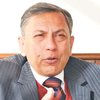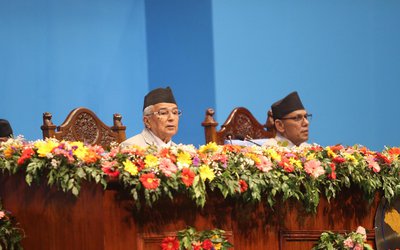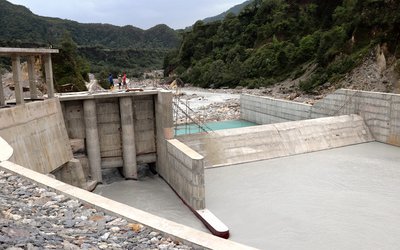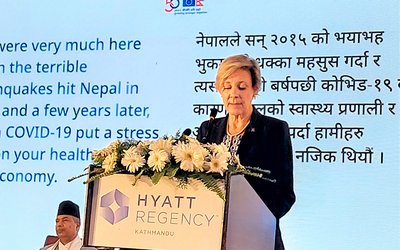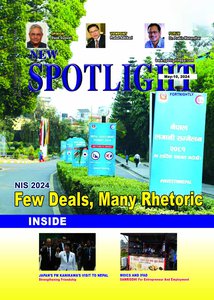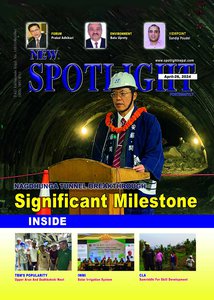
Even as the Covid 19 pandemic rages and Nepal has appealed for international assistance, a bizarre political scenario is unfolding in the country.
The Health Minister has been replaced. A Government that has announced General Elections in November this year and one that has not secured a vote of confidence of the Lower House of Parliament has now been expanded to include three Deputy Prime Ministers. In all ten Madhesi leaders from a faction of the Janata Samajwadi Party (JSP) have been sworn in. A further expansion is awaited as key portfolios such as Home and Defence remain unfilled. Erstwhile foes have become uneasy bedfellows. There is a compromise of values and principles on all sides in the quest for cold power.
Norms of constitutional propriety and principles of democratic governance are being consigned to the dustbin. Facts speak for themselves. Within a period of six months the lower house of Parliament has been dissolved twice. After the first dissolution was ruled unconstitutional, a series of questionable steps were taken that ensured continuation of the current Prime Minister K P Sharma Oli.
Even as Oli lost support of the reinstated House, he was reappointed Prime Minister as leader of the single largest party and given thirty days to seek a vote of confidence. Neither did Oli seek the vote, nor did he resign. Sanguine in the belief that an alternative government is not possible given the deep fragmentation witnessed in several political parties, he recommended that a clause relating to the appointment of an individual Member of Parliament who has the backing of the majority, be invoked. Despite having publicly acknowledged that he did not have majority support – within his own party, the Communist Party of Nepal (UML) or UML, the group led by former Prime Ministers Madhav Kumar Nepal and Jhalanath Khanal had parted ways with Oli and the JSP was split down the middle with a faction loyal to Madhesi leaders Mahant Thakur and Rajendra Mahato supporting Oli and another loyal to Upendra Yadav and former PM Baburam Bhattarai opposed- Oli rushed to the President claiming support of 153 MPs including those belonging to the Madhav Nepal and Upendra Yadav groups. Rival Sher Bahadur Deuba of the Nepali Congress accompanied by a large number of MPs including former PM Madhav Kumar Nepal as well as Upendra Yadav personally submitted a list of 149 signatures to the President and staked claim to Prime Ministership. The list comprised MPs from the NC, NCP (Maoist Centre) led by Prachanda, and the Madhav Nepal and Upendra Yadav factions of the UML and JSP respectively. Instead of inviting Deuba to form a new Government, the President rejected both claims on the ground of overlapping names, thereby allowing Oli to continue as PM; thereafter, on the recommendation of the Cabinet she promptly dissolved the House in a late night Presidential declaration plunging the country into yet another political crisis. The matter is now being heard by a Constitutional Bench of the Supreme Court.
A widespread perception prevalent in Nepal is that PM Oli has India’s backing; participation of the Mahant Thakur faction of the JSP that has traditionally been close to India in the Oli Government (Oli has however, brought an ordinance on citizenship that meets some concerns of the Madhesi leadership) as well as a series of high level visits starting with Secretary (R), Army Chief, Foreign Secretary and the Head of the Foreign Affairs Cell of the BJP to Nepal and the visit of the Nepalese Foreign Minister to India in quick succession are cited in support of this view. Statements referring to ongoing political developments as “internal matters of Nepal” have further strengthened this perception.
While it is necessary for India to work with whichever Government is in power, India cannot ignore the long term damage by Oli led governments to bilateral relations, particularly with respect to the boundary. The Oli regime is also responsible for the significant expansion of Chinese presence and influence in Nepal, including in domestic political matters and for unleashing anti-India nationalist rhetoric since 2015. Nor should India ignore the other political actors, in particular democratic forces such as the Nepalese Congress with whom India shares a friendly relationship over several decades. Oli’s attempts to undermine the structure of constitutional governance and his autocratic behaviour have also not added to his domestic popularity.
Furthermore, even though the dominant Communist alliance may have splintered in Nepal with China suffering a temporary setback, there is no guarantee that the situation will not be reversed given that China is a long term player. During the pandemic, even as India grapples with its own shortages, China’s role has increased with supply of vaccines. China has held four meetings of a sub-group of SAARC countries that are all participants in the Belt and Road Initiative to discuss the Covid crisis but also to explore synergies and best practices emanating from the implementation of BRI projects. Nepal, under Oli is a key partner in this exercise.
India must reach out to all political forces in Nepal and dispel the widespread public perception that it is taking sides and backing an autocratic and increasingly unpopular regime. Our long term strategic interests lie in a peaceful, stable, prosperous and democratic Nepal and India must continue to support all efforts towards this end.
Ray is the former Indian Ambassador to Nepal
Source: The Times of India
